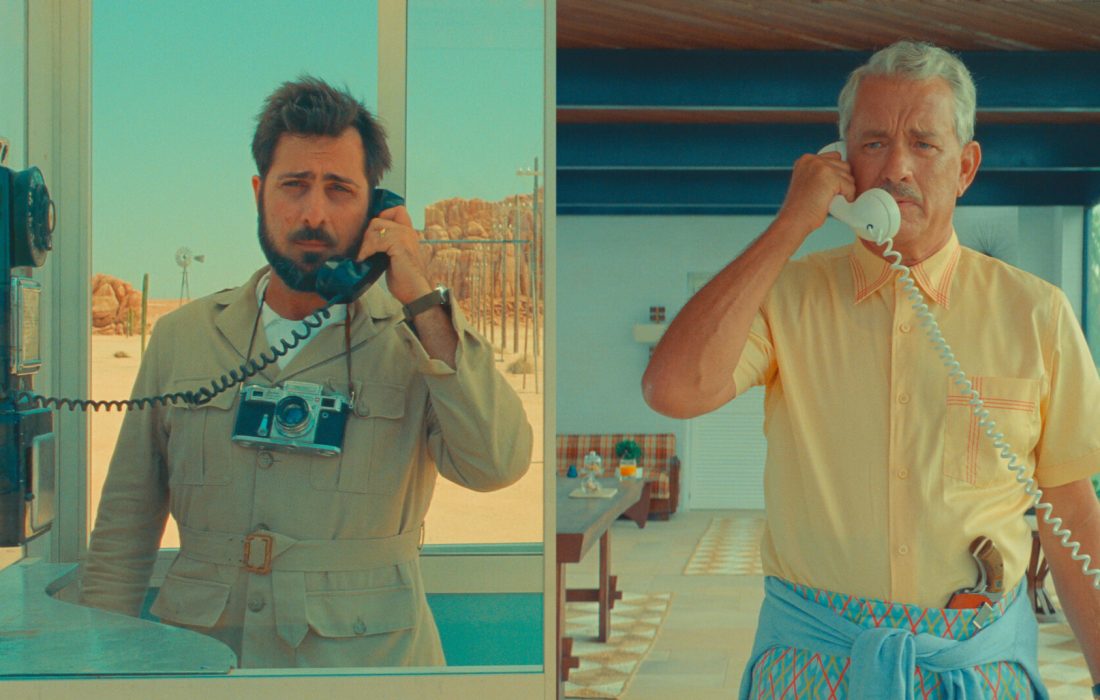Asteroid City. Farm Route 6, mile 75. 1955.
Wes Anderson’s ‘Asteroid City’ is Beautifully Convoluted
This article contains spoilers for “Asteroid City.”
Asteroid City. Farm Route 6, mile 75. 1955.
That’s where director Wes Anderson takes the audience in his latest film — sort of.
Anderson is known for his symmetrical framing, striking imagery, lengthy monologues and unconventional, nonlinear storytelling. With “Asteroid City,” he may have mastered them all.
Enter Bryan Cranston in black and white film.
“Asteroid City does not exist,” he says, with a Rod Sterling-type Transatlantic accent.
Cranston’s (“Breaking Bad,” “Malcolm in the Middle”) character addresses the audience directly, revealing himself as the host of a television series telling the story of how a play — “Asteroid City” — was produced. He gestures to Edward Norton’s character Conrad Earp, the playwright. In a blink-and-you-miss-it sequence, he introduces the play’s actors, ending with Tom Hanks, in his Anderson movie debut.
After minutes of black and white, the scene switches to Anderson’s most striking color palette to date and the main setting of the film — Asteroid City. A teal sky contrasts the golden sand of the arid wasteland.
And then Augee Steenback’s car breaks down.
Played by Jason Schwartzman, Augee was planning to pit stop in Asteroid City with his son and three daughters before meeting his father-in-law played by Hanks (“Forrest Gump,” “Castaway”). Augee, clutching a Tupperware, then tells his children their mother died three weeks ago and her ashes are in said Tupperware.
This sets up the subtle but pensive exploration of grief which carries through the remainder of the film, perfectly executed by Schwartzman (“Rushmore,” “Scott Pilgrim vs. the World”) and Hanks. But exploration is constantly undercut by the cuts to black and white television, reminding viewers none of it is real.
Norton’s (“Moonrise Kingdom,” “Fight Club”) Conrad is shown choosing Schwartzman, playing an actor now, for the role of Augee as he auditions in his living room, after which they share a passionate kiss. And then they’re back in the desert and the play.
Augee’s son Woodrow was invited to Asteroid City because he is one of five junior stargazers being honored for individual inventions — his being a device that can project an image onto the moon.
While very few scenes take themselves too seriously, the lightest ones, naturally, feature Steve Carell (“The Office,” “Beautiful Boy”) and his comedic genius as the motel manager. Wearing a buffalo bolo tie with a green poker visor and a holstered gun, he converses and jokes with the junior stargazers’ parents.
Junior stargazer Dinah’s mother and the female lead is Midge Campbell, played by Scarlett Johansson (“Lost In Translation,” “The Avengers”). She’s an actress in a play within a show. She’s stern but flirts with Augee as their kids, Dinah and Woodrow, fall for one another.
These relationships are the emotional threads that define many of Anderson’s movies. “Moonrise Kingdom” from 2012 is about a boy scout who fell for a girl. 2009’s “Fantastic Mr. Fox” is about Mr. and Mrs. Fox protecting their home. But “Asteroid City” sees multiple relationships budding at once, while the Steenbecks are still silently dealing with their matriarch’s death.
The movie takes a turn when the entire cast is met by a claymation alien who comes down from space and steals the meteorite that has defined the town. Instead of staying for a few days as they all planned, the visitors are held in the picturesque town in the middle of nowhere by a government-issued quarantine.
But after this life-altering moment for the characters, the audience is reminded they’re just actors when director Schubert Green, played by Adrien Brody (“The Grand Budapest Hotel,” “Succession”), shows his estranged wife the miniature flying saucer he built — a scaled-down version of what just dwarfed the entire city.
The time in quarantine is isolating but fulfilling for every character. The junior stargazers bond, no longer feeling alone in their intelligence. The storylines introduced briefly early on are all explored.
Maya Hawke’s (“Stranger Things,” “Do Revenge”) religious school teacher June loosens up as she tries to teach her class about space with a lesson plan developed before these children saw an alien. Augee’s daughters come to accept their mother is gone as their grandfather, Hanks, lets them bury the ash-filled Tupperware in the sand.
Jeffrey Wright’s gravely voice is instantly recognizable in modern cinema and that’s put on full display when he addresses the city as General Gibson. This is Wright’s (“The Batman,” “Westworld”) second role in an Anderson film, after playing arguably the best character in “The French Dispatch” in 2021.
At the emotional climax of the movie, Schwartzman runs off set and re-enters the television show, leaving the theater entirely. He stands on a balcony and looks across to see Margot Robbie (“Once Upon a Time… in Hollywood,” “The Wolf of Wall Street”) who was supposed to play his wife in a flashback but was cut for pacing reasons.
“I still don’t understand the play,” Schwartzman admits as the actor.
“It doesn’t matter,” Robbie’s actress replies as it starts to snow. “Just keep telling the story.”
It’s a beautiful way for Anderson to speak to the audience without using the host’s cheesy narration. The movie is hard to follow. The characters are complex and ever-changing. But it’s OK.
The seemingly never-ending cast of A-list actors is choosing to work with Anderson for his work — Jeff Goldblum is seen playing the alien for less than a minute.
In writing about art, “Asteroid City” feels like the pinnacle of Anderson’s 11 movies and a culmination of the career he’s worked to create. His films are often not straight-forward but neither is love or life or death.
“Asteroid City” is in theaters now.
Featured image courtesy of Pop. 87 Productions/Focus Features

